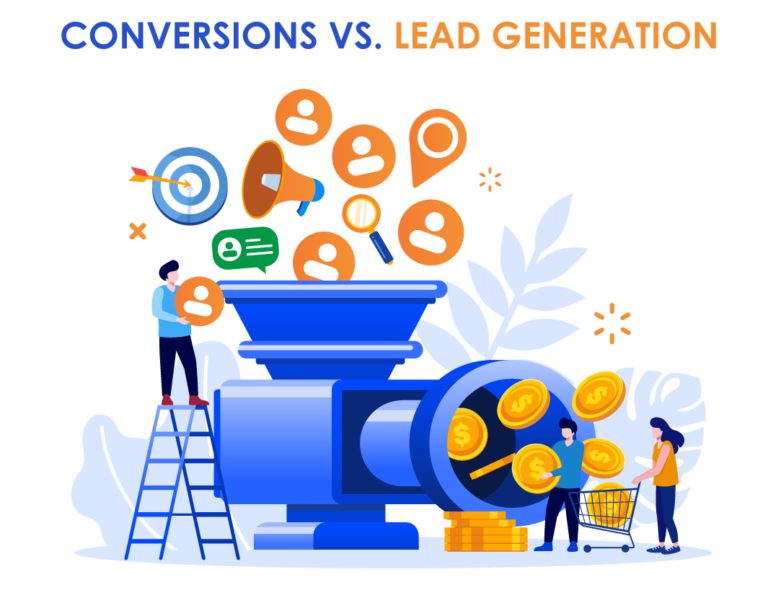What is the difference between conversions & lead generation?

Marketing terms can be confusing. Everyone is talking about “conversions,” but is that the same as “lead generation”?
Today’s topic is: What is actually the difference between conversions and lead generation?
We think it’s about time to get some clarity on that once and for all.
What is conversion?
Conversion is getting someone to do what you want them to do. Typically, this entails convincing them to proceed to the next stage of your sales funnel, whatever that stage may be.
The Most Popular Conversion Types
Here are the most common conversion types:
- Potential customer → Site visitor. You pique a potential customer’s interest and persuade them to visit your website.
- Site visitor→ Lead. You persuade a site visitor to give you their contact information.
- Lead → paying customer. You pitch your product to a lead & persuade them to buy it.
- Paying customer → Repeat customer. You pitch a product to an existing customer and persuade them to buy it.
When someone is talking about conversions, they are usually referring to one of these four conversion types.
What Is a Conversion Rate?
A conversion rate is a metric that indicates how many people saw a call to action and followed through on it (which means they converted).
Here are a couple of examples:
- If you show your ad to 100 people and 10 of them click on it, your ad’s conversion rate is 10%.
- If 100 people visit your website and ten of them subscribe to your email list, the conversion rate of your website is 10%.
For the sake of simplicity, we used a conversion rate of 10% in these examples. Conversion rates can vary dramatically.
What is a lead?
A lead is a potential customer who has expressed interest in your product or service and has also provided you with their contact information.
Alternatively, it could be someone who has not provided you with their contact information but has expressed an interest in your product when you have contacted them directly.
What is lead generation?
Lead Gen is the process of converting potential customers into leads by convincing them to give you their email addresses, known as lead generation.
This is usually accomplished through a lead generation funnel known as the reverse squeeze page funnel:
You have the option of creating a lead magnet, a landing page for that lead magnet, or driving traffic to that landing page.
What should be the plan when you want to generate more leads?
Lead generation can be divided into two major tasks:
1- Generating traffic This can include SEO, social media marketing, influencer marketing, paid ads, and other methods.
2- Converting that traffic. This includes developing a lead magnet, designing a landing page for it, optimizing conversion rates, and so on.
It is critical to obtain both of them. If you can’t generate traffic, there won’t be anyone to convert.
Meanwhile, if you can generate traffic but can’t convert those visitors into leads, you’ll end up burning through your marketing budget with nothing to show for it.
Lead Quantity vs. Lead Quality
When it comes to lead generation, it’s critical to understand that you must strike a balance between lead quantity and lead quality.
When you place too much emphasis on one of these, the overall conversion rate of your sales funnel suffers. Always keep in mind that the goal of lead generation isn’t to collect a slew of random email addresses, but to obtain contact information for your ideal customers.
So basically, to summarize:
Conversion is getting someone to do what you want them to do (e.g., click on your ad, subscribe to your email list, buy your product, etc.).
The process of converting potential customers into leads by convincing them to give you their email addresses is known as lead generation.
So, in a business context, the term “conversion” is an umbrella term that covers all instances of getting someone to take the action that you want them to take.
Meanwhile, the term “lead generation” falls under the “conversion” umbrella because it refers to a specific type of conversion.
Lead generation builds trust, visibility, and credibility in your business—specifically with the sorts of people who might be interested in your products. They help you build traffic with high-quality prospects, so you can convert them to sales. We hope this blog has taught you something new.
